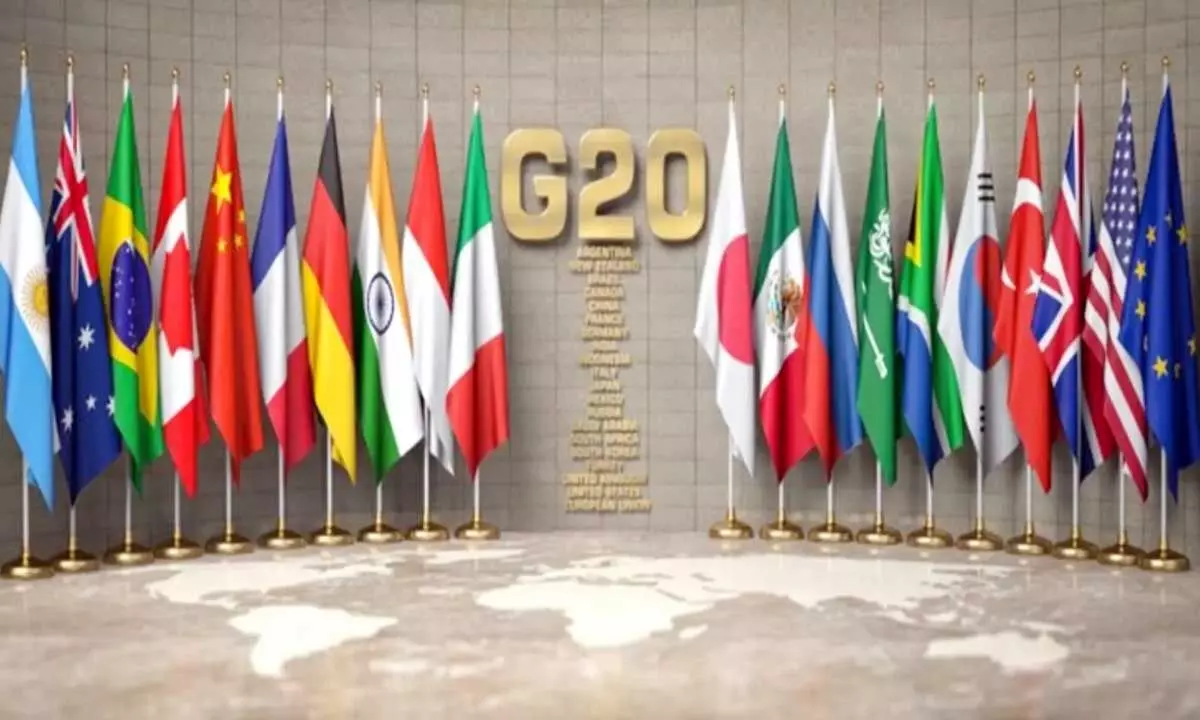G20 should come forward to bail out poor countries from impending crisis
It is disturbing that Pak, Sri Lanka and Bangladesh have sought IMF loans to tide over their economic crisis
image for illustrative purpose

In a globalised world, the crisis being faced by other countries, including the advanced economies, will have a ripple effect on India. The first and major impact is on higher prices of commodities like oil and metals
The meeting of G20 Finance Ministers and central bank chiefs scheduled for later this week is being held in the backdrop of good news that fears of recession in Europe are fading away. Green shoots of growth in the British corporate sector have been recorded after a gap of seven months, while the Eurozone saw growth touch a nine-month high this month. These are encouraging reports at a time when the global economy is forecast to nosedive to 2.9 per cent this year from last year’s 3.4 per cent.
Much of the sluggishness is attributed to the recessionary trends in developed economies like the U.S., the U.K. and the European Union. In fact, it has been to such extremes that the Managing Director of International Monetary Fund (IMF), Kristalina Georgieva declared that emerging markets and developing economies are expected to account for about 80 per cent of global growth this year. India alone is expected to contribute about 15 per cent of that.
Yet the positive impact of an economic recovery in the developed world cannot be overstated right now. In case these trends continue, global growth is likely to be much higher than the 3.1 per cent currently forecast for 2024. In the case of the U.K., a composite reading of private sector output in a survey of purchasing managers from S&P Global rose to 53 in February, much higher than the expected level of 49. This is significant since any reading above 50 indicates economic growth. At the same time, it also showed a sustained increase in prices, indicating that the Bank of England would have to continue its monetary tightening to bring inflation down to manageable levels.
Similar data for the Eurozone from the survey showed the indicator at 53.2 in February compared to 50.8 in January. In other words, growth has finally resumed in the region after the pandemic and despite the ongoing Ukraine conflict.
This upbeat news comes even as the G20 meeting is set to discuss issues related to the mounting debt in developing and poor countries. Around 60 per cent of low-income countries are facing debt distress currently, according to data with the IMF. This is twice the number that was in the same crisis in 2015. Already South Asian countries like Sri Lanka, Pakistan and Bangladesh have sought IMF loans to rescue them from financial emergencies.
In a globalised world, the crisis being faced by other countries, including the advanced economies, will have a ripple effect on this country. The first and major impact is on higher prices of commodities like oil and metals. For the time being oil prices have stabilised at a range between 83 and 87 dollars per barrel. But predictions are being made that these could again rise rapidly and touch 100 dollars per barrel by the end of 2023. Similarly, prices of metals have moderated since the initial spurt after the Ukraine war. But much will depend on the continued smooth movement of global supply chains, which were disrupted at that time.
Secondly, this is likely to impact export growth, which is dependent to a great extent on sustained demand from developed economies. Europe and the U.S. are key markets for Indian exporters. Recessionary trends in these regions have already led to a plateau in export growth over the past few months. This is in sharp contrast to the buoyancy in 2021-22 that had led the country to reach a record level of 420 billion dollars of merchandise exports.
And finally, the crisis being faced by a country’s neighbours is bound to have a spill-over effect. In the case of Sri Lanka, the fears had been over an influx of refugees from the island-nation. There was a flow of migrants at the initial stages of the crisis but this has now subsided as the situation has stabilised in the country. Otherwise, the skyrocketing inflation and non-availability of essential goods had forced many to abandon their homes and flee to India.
A similar situation has now occurred in Pakistan with inflation making essential goods unaffordable for the common man. In this case there is not likely to be a refugee influx given the frictions between the two countries but there could be political uprisings that will have their inevitable repercussions.
It is disturbing to note that all three major neighbouring countries have sought IMF loans to bail themselves out of economic crises. So far only the Bangladesh proposal has been approved and 4.7 billion dollars will be provided as loan from the multilateral financing institution. Sri Lanka’s plea is still hanging in the balance as China has yet to approve the debt restructuring plan. In the case of Pakistan too, negotiations are still under way as the IMF is imposing stringent conditions.
In this backdrop, the news that the U.K. and Europe are finally showing some signs of positive growth must be viewed as an encouraging trend. The revival of these major economies is bound to have a positive impact globally. At the same time, the forthcoming G20 conference needs to consider ways in which to soften the impact of international recessionary trends on low-income countries. India needs to take the initiative, given the economic distress being faced in several parts of South Asia.

